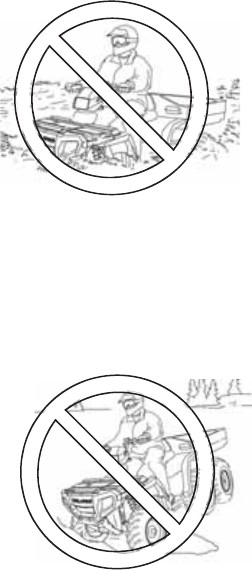
20
SAFETY
Safety Warnings
Operating Through Deep Water
Operating the vehicle through deep or
fast-flowing water could cause the tires to
float, causing loss of control or overturn.
Avoid operating the vehicle through deep
or fast-flowing water. If it's unavoidable to
enter water that exceeds the
recommended maximum depth (see page
59):
• Travel slowly.
• Balance your weight carefully.
• Avoid sudden movements.
• Maintain a slow and steady forward motion. Do not make sudden turns or
stops, and do not make sudden throttle changes.
• Wet brakes may have reduced stopping ability. After leaving water, test the
brakes. Apply them lightly several times while driving slowly. The friction will
help dry out the pads.
Operating on Frozen Bodies of Water
Operating on frozen bodies of water may result
in serious injury or death if the vehicle and/or
the operator fall through the ice.
Never operate the vehicle on a frozen body of
water unless you have independently verified
that the ice is sufficiently thick to support the
weight and moving force of the vehicle, you
and your cargo, together with any other vehi-
cles in your party. Variances in snow depth
and/or water currents may result in uneven ice
thickness. Always check with local authorities
and residents to confirm ice conditions and
thickness over your entire route. Operators
assume all risk associated with ice conditions
on frozen bodies of water.
